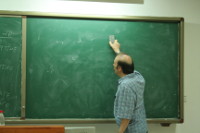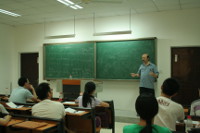The Automata-Theoretic Approach to Linear Temporal Logic
Lecturer: Moshe Y. Vardi
The automata-theoretic approach to linear temporal logic uses the theory of automata as a unifying paradigm for program specification, verification, and synthesis. Both programs and specifications are in essence descriptions of computations. These computations can be viewed as words over some alphabet. Thus, programs and specifications can be viewed as descriptions of languages over some alphabet. The automata-theoretic perspective considers the relationships between programs and their specifications as relationships between languages. By translating programs and specifications to automata, questions about programs and their specifications can be reduced to questions about automata. More specifically, questions such as satisfiability of specifications and correctness of programs with respect to their specifications can be reduced to questions such as nonemptiness and containment of automata.
Unlike classical automata theory, which focused on automata on finite words, the applications to program specification, verification, and synthesis, use automata on infinite words, since the computations in which we are interested are typically infinite. This course provides an introduction to the theory of automata on infinite words and demonstrates its applications to program specification, verification, and synthesis.






